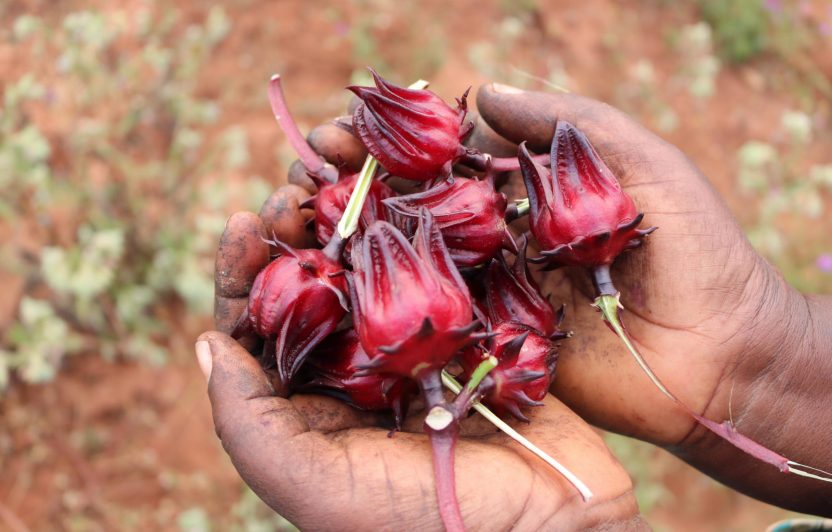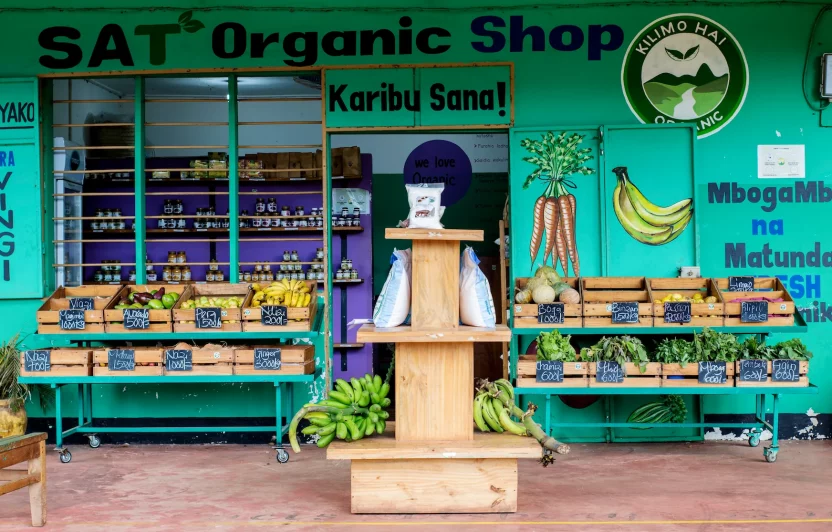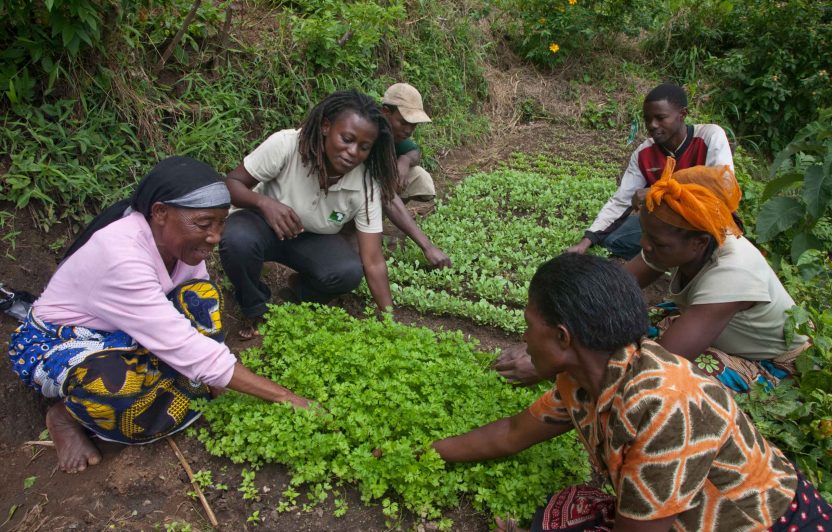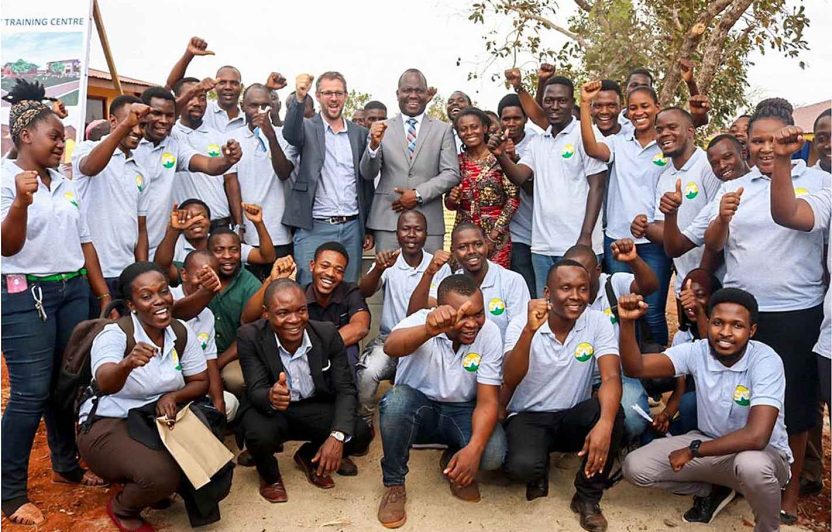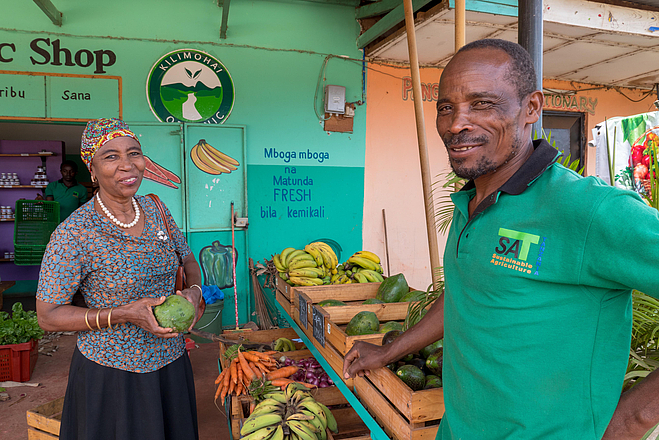
Covering almost 279,000 hectares, Tanzania’s organically farmed land area is the largest of all countries in sub-Saharan Africa (as of 2017, including areas in conversion). But this is only 0.7 percent of its agricultural land (Willer and Lernoud, 2019). The demand for more shows that organic farming has potential, but many producers lack the knowledge and capital to convert to organic farming. Market access is especially difficult for small farmers due to a lack of infrastructure and market information. Organic certification is also complex and costly.
Establishing and expanding an organic sector requires years of preparation and commitment from various institutions and individuals. In addition to international research, recognized organic farming training courses, advertising campaigns, political lobbying and the commitment of large associations, local and national initiatives are also needed. Biovision Foundation is working with partner organizations in East Africa to identify, promote and connect such initiatives. One encouraging example is the Tanzanian NGO Sustainable Agriculture Tanzania (SAT), with which Biovision has been working since it was founded nine years ago. Within just a few years, SAT has evolved from managing a single vegetable patch into a recognized and sought-after agroecology institution.
Think and promote local
When Austrian Alexander Wostry started composting on a piece of land and cultivating a small vegetable patch organically for the first time during an internship in Tanzania in 2008, he laid the foundation for the Garden of Solidarity project (in Swahili, Bustani Ya Tushikamane). “The idea behind it was to introduce small farmers in the Morogoro region to organic farming and to demonstrate an alternative to using pesticides and artificial fertilizers,” explains Wostry. Janet Maro, then a student at the Sokoine University of Agriculture in Morogoro, works with Wostry in her spare time and contributes her ideas to participatory training for interested farmers. From the very beginning, local farmer groups are involved in project development. “They have an interest in developing their methods of production. They themselves decide how, when and in which topics they need external support,” Maro says.
In 2011, Alexander Wostry and Janet Maro founded SAT to expand their activities and better secure their project institutionally. At present, their local organization is unique in the Tanzanian landscape of organic agriculture. Although the Tanzania Organic Agriculture Movement (TOAM) has been involved in the sector since 2005, it is a national umbrella organization that is active on a different level than SAT. Based on its experience with a training garden and organic farming courses in the fields of farmer groups , SAT founded the Farmer Training Center for agroecology in Vianzi near Morogoro in 2013. SAT now implements various forms of agroecological management for educational purposes on more than 230 hectares of land under dry, difficult climatic conditions and conducts research projects on mixed crops, agroforestry systems or biological pest control with scientific partners such as ETH Zurich, the Research Institute of Organic Agriculture (FiBL) or World Agroforestry (ICRAF). NGOs such as Swissaid, Swisscontact or the Burundi Organic Agriculture Movement (BOAM) and governmental organizations such as the Tanzanian Ministry of Water and Irrigation also use the training center for organic farming courses.
Organic growth
Today, Janet Maro, Alexander Wostry and their team are sought-after experts for practical and strategic issues regarding organic farming and agroecology: various international development cooperation organizations entrust them with consulting mandates, Tanzanian ministries invite them to workshops, and universities contact them for participatory research projects. At the same time, the SAT founders, who are now married and have three children, exchange information with the producing farmers almost daily, buy their products in the SAT organic shop in Morogoro, and have successfully initiated the first export of certified spices and teas to Europe. By cooperating with private and state agencies, SAT has been able to contribute significantly to increasing awareness of Tanzanian organic agriculture and to make agroecology attractive and comprehensible for small farmers.
Since third-party certification is currently too complex and expensive for many farmer groups and cooperatives, SAT decided upon internal certification under the Participatory Guarantee System (PGS), a quality assurance system specifically adapted to local market systems. The farmers’ groups have to follow the “East African Organic Products Standard”, but they also define their own requirements, which they independently ensure are met. TOAM thus governs entire farmer group instead of individual farms.
In Tanzania, not only SAT has developed further in recent years; the whole organic movement has grown and become more professional. Although international networking is important to give the organic sector an additional boost, local commitment, entrepreneurship, and the combination of traditional knowledge with scientific findings are just as indispensable.
This is a translation of an article that was first published in the magazine “Ökologie und Landbau”, issue 04/2020


